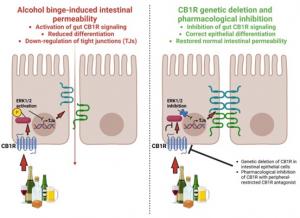New Study Links Intestinal Cannabinoid Receptors to Alcohol-Induced Leaky Gut
A new study reveals that gut cannabinoid receptor 1 (CB1R) plays a key role in alcohol binge-induced intestinal permeability, commonly known as "leaky gut."
BETHESDA, MD, UNITED STATES, May 7, 2025 /EINPresswire.com/ -- Heavy alcohol consumption is a leading cause of gastrointestinal diseases, with binge drinking linked to increased intestinal permeability—a condition commonly known as "leaky gut." Despite the significant health impact of alcohol-associated gastrointestinal disorders, effective pharmacological treatments remain limited. A new study published in eGastroenterology explores the role of gut cannabinoid receptor 1 (CB1R) in alcohol binge-induced intestinal permeability and reveals how its inhibition can help protect the gut barrier.The research, conducted by scientists from the National Institute on Alcohol Abuse and Alcoholism (NIAAA) at the National Institutes of Health (NIH), demonstrates that alcohol bingeing increases endocannabinoid levels in the proximal small intestine, triggering CB1R activation in intestinal epithelial cells. This activation disrupts tight junction proteins, which generally maintain the integrity of the gut lining, leading to increased intestinal permeability. This process can allow harmful substances, such as bacteria and toxins, to enter the bloodstream, contributing to inflammation and other health complications.
To investigate the role of CB1R, the researchers developed genetically modified mice with intestinal epithelial-specific CB1R deletion (CB1IEC−/− mice). They found that alcohol bingeing significantly increased gut permeability in normal mice, but this effect was absent in CB1IEC−/− mice, indicating that CB1R is a key mediator of alcohol-induced leaky gut.
Additionally, the study examined the effects of pharmacological CB1R inhibition using a peripherally restricted CB1R antagonist (S)-MRI-1891. When administered to normal mice before alcohol bingeing, this compound successfully prevented the increase in intestinal permeability. However, the drug had no effect in CB1IEC−/− mice, further confirming that CB1R in the intestinal epithelium is responsible for alcohol-induced gut barrier disruption.
Mechanistic studies revealed that CB1R activation in the gut epithelium triggers the ERK1/2 signalling pathway, which leads to the downregulation of tight junction proteins and a reduction in villus length—key factors contributing to a leaky gut. By inhibiting CB1R, researchers could reverse these changes, restoring gut barrier function and improving overall gut health.
These findings hold significant implications for the treatment of alcohol-related digestive disorders. Currently, there are no FDA-approved drugs specifically designed to treat alcohol-induced intestinal permeability. The study suggests that targeting CB1R with peripherally restricted antagonists could provide a novel therapeutic approach, potentially preventing systemic inflammation and other complications associated with alcohol-induced gut barrier dysfunction.
These insights could have broader applications in gastrointestinal health beyond alcohol-related gut disorders. The endocannabinoid system is known to influence gut motility, immune function, and microbiota composition, and its role in intestinal permeability suggests that CB1R inhibition may be beneficial in other conditions characterized by increased gut permeability, such as inflammatory bowel disease and metabolic disorders.
However, the study also highlights some limitations. While CB1R inhibition effectively prevented alcohol-induced leaky gut, it did not significantly impact metabolic parameters or liver disease progression. This suggests that although a leaky gut contributes to alcohol-related health issues, other mechanisms are also at play in the development of liver disease and metabolic dysfunction.
Future research will explore whether combining CB1R inhibitors with other therapeutic strategies could offer more comprehensive protection against alcohol-induced organ damage. Additionally, further studies are needed to assess the long-term safety and efficacy of CB1R antagonists in clinical settings.
This groundbreaking study advances our understanding of the gut’s response to alcohol and opens new avenues for targeted therapies. By identifying CB1R as a crucial mediator of alcohol-induced intestinal permeability, researchers have paved the way for potential pharmacological interventions that could help mitigate the harmful effects of binge drinking on gut health.
Funder
The authors received financial support from the Intramural Program of the National Institute on Alcohol Abuse and Alcoholism (NIAAA), NIH (Grant Nos. AA00350, AA000369, AA000368), the National Research, Development and Innovation Office (Grant No. PD-139012) and the János Bolyai Research Scholarship of the Hungarian Academy of Sciences.
See the article:
Maccioni L, Dvorácskó S, Godlewski G, et al. Gut cannabinoid receptor 1 regulates alcohol binge-induced intestinal permeability. eGastroenterology 2025;3:e100173. doi:10.1136/egastro-2024-100173
eGastroenterology is a new, open-access, and open peer-reviewed BMJ Journal, which focuses on basic, clinical, translational, and evidence-based medicine research in all areas of gastroenterology (including hepatology, pancreatology, esophagology, and gastrointestinal surgery).
For more information, please visit: egastroenterology.bmj.com and follow us on Twitter (@eGastro_BMJ).
Contact:
Dr. Bin Gao
National Institute on Alcohol Abuse and Alcoholism, National Institutes of Health
Bethesda, Maryland, USA
Email: bgao@mail.nih.gov
Dr. George Kunos
National Institute on Alcohol Abuse and Alcoholism
george.kunos|nih.gov | |george.kunos|nih.gov
Legal Disclaimer:
EIN Presswire provides this news content "as is" without warranty of any kind. We do not accept any responsibility or liability for the accuracy, content, images, videos, licenses, completeness, legality, or reliability of the information contained in this article. If you have any complaints or copyright issues related to this article, kindly contact the author above.
Clean Water Demand Fuels Defoamers Market Growth Amidst Rising Industrial Applications and Environmental Regulations
Sends wins top honours for innovative Global Merchant Services in the UK
Dr. Mohana Rao Patibandla (Dr. Rao) Recognized by The Times of India for Transforming Neurosurgical Care in India
Kalendarium
Więcej ważnych informacji
 Jedynka Newserii
Jedynka Newserii

 Jedynka Newserii
Jedynka Newserii

Transport

Trwają prace nad zmianami w finansowaniu kolei. Obecny system powoduje duże problemy branży i brak konkurencyjności transportu szynowego
To nie brak środków, ale systemowe bariery, w tym uzależnienie od programów unijnych, uniemożliwiają efektywne inwestycje na kolei – oceniają przedstawiciele Izby Gospodarczej Transportu Lądowego oraz Railway Business Forum. To powoduje problemy firm wykonawczych, ma negatywny wpływ na konkurencyjność branży i rozwój gospodarczy Polski. Osłabia także strategiczne zdolności transportowe, niezbędne dla bezpieczeństwa państwa. Eksperci z IGTL i RBF apelują o pilną reformę finansowania kolei. Jak podkreślają, nie wymaga ona nowych źródeł finansowania, ale tylko ich uelastycznienia. Nad swoimi rozwiązaniami pracuje też resort infrastruktury.
Edukacja
Stabilność zatrudnienia jedną z najważniejszych kwestii dla pokolenia Z. Nie chodzi jednak o wieloletnią pracę na etacie

Wraz z dynamicznymi zmianami zachodzącymi na rynku pracy dla pracowników istotna jest stabilność zatrudnienia. Widać to także wśród pokolenia Z, wchodzącego na rynek pracy, dla którego była to jedna z trzech najważniejszych kwestii przy wyborze pracodawcy. Jak wyjaśniają eksperci Konfederacji Lewiatan, nie chodzi już jednak o formę czy długość zatrudnienia, ale o samopoczucie pracownika.
Polityka
Lekarz: Karol Nawrocki zapewne sporo papierosów w swoim życiu wypalił. Stwierdził, że w kampanii lepiej będzie je zastąpić woreczkami nikotynowymi

Kandydat na prezydenta Karol Nawrocki podczas ostatniej debaty w TVP wykonał nietypowy gest, wsuwając do ust saszetkę, co wywołało dyskusję na temat alternatywnych produktów nikotynowych. Były wiceminister zdrowia przypomina, że stosowanie takich woreczków to jedna z metod walki z uzależnieniem od palenia tytoniu, wpisująca się w strategię redukcji szkód, a przykład osoby publicznej może podnieść świadomość społeczną na ten temat. Jednocześnie lekarz zwraca uwagę, że tego typu produkty przeznaczone są wyłącznie dla osób dorosłych. Reguluje to przyjęta w maju nowelizacja ustawy tytoniowej.
Partner serwisu
Szkolenia

Akademia Newserii
Akademia Newserii to projekt, w ramach którego najlepsi polscy dziennikarze biznesowi, giełdowi oraz lifestylowi, a także szkoleniowcy z wieloletnim doświadczeniem dzielą się swoją wiedzą nt. pracy z mediami.









.gif)

 |
| |
| |
|